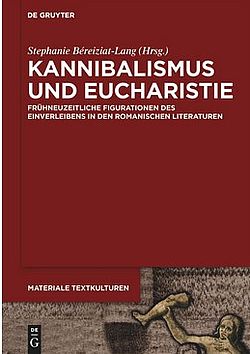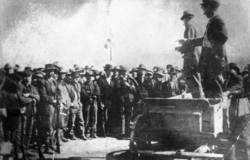Les publications
Kannibalismus im Zeichen des ‚gerechten Krieges‘: Zur textuellen Einverleibung indigener Anthropophagie in Piratenerzählungen des 17. Jahrhunderts
06 mai 2024 Edition: Kannibalismus und Eucharistie - Frühneuzeitliche Figurationen des Einverleibens in den romanischen Literaturenhttps://doi.org/10.1515/9783111323947
Afterlives of Ottoman Orphans in Germany during World War I: Microhistorical and Biographical Approaches to Technology, Expertise, and Labor in Turkey
01 mai 2024https://muse.jhu.edu/article/927858
ABSTRACT
This article applies a (micro)biographical approach to the life stories of two Ottoman orphans sent to Germany to receive vocational training during World War I, Ali and İsmail Dağlı. Coupling family archives, oral and visual sources with state documentation, I elaborate on the post-Ottoman afterlives of German know-how, education, and capital in the social and economic history of Turkey. Biographies of Dağlı brothers show that the successors of both empires restored former channels of circulation of expertise, technology, and labor. Especially seen in the context of Jewish emigration, the life and work history of the brothers elucidate the positive reception of their German education, the importance of their position as “cultural intermediaries,” and the extent of Turkish-German business entanglements.
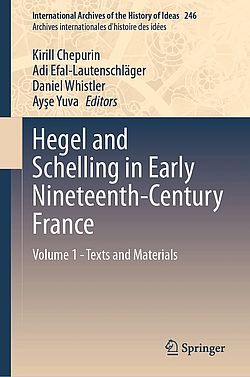
Hegel and Schelling in Early Nineteenth-Century France. Volumes 1,2
23 avril 2024
Ayse Yuva
, Kirill Chepurin, Adi Efal-Lautenschläger, Daniel Whistler, Ayşe Yuva
International Archives of the History of Ideas Archives
Edition: Springer Cham
Collection: International Archives of the History of Ideas Archives
ISBN: 978-3-031-39328-0
L'histoire du Hegel français n'a certes pas commencé avec Wahl et Kojève: Hegel and Schelling in Early Nineteenth-Century France est un ouvrage en deux volumes qui examine la réception française de Hegel et Schelling en France entre 1801 et 1848. Outre des traductions d'extraits inédits en langue anglaise, le premier volume présente une introduction à cette histoire transnationale où des philosophes tels que Cousin, Leroux, Proudhon, Quinet, Ravaisson, Vera, et d'autres figures plus négligées comme Lerminier, Barchou de Penhoën, Bénard, Lèbre, Willm etc. ont joué un rôle majeur. En montrant comment ces auteurs ont repris, transformé ou rejeté les concepts de l'idéalisme allemand, l'ouvrage vise à dépasser un récit de l'histoire de la philosophie centré sur un cadre national. Dans le deuxième volume, on trouvera un certain nombre d'études soulignant les enjeux de ces échanges.
Lien pour le volume 1 / Lien pour le volume 2
Published: 30 November 2023
Le cumul des énergies
22 avril 2024 Artikel (Online)Edition: la vie des idées
https://laviedesidees.fr/Fressoz-Sans-transition
L’historien J.-B. Fressoz fournit la première enquête généalogique sur la notion de transition énergétique. Face aux discours qui remettent la « transition » toujours à plus tard, l’historien relève le défi politique inédit d’une sortie définitive des énergies fossiles.
‘Sound-Writing’ Technologies and Early Field Recordings in the Ottoman Empire
04 avril 2024 Edition: DergiPark Akademikhttps://dergipark.org.tr/en/pub/srtc/issue/84330/1449023
Abstract
The history of early sound recording technologies in the Ottoman Empire has been studied mainly from the perspectives of music production, comparative musicology, and ethnomusicology. In fact, while hundreds of commercial and musical cylinders were being produced in Istanbul, Beirut, and elsewhere, European anthropologists, ethnologists, linguists, orientalists, etc. were traveling throughout the Balkans, Anatolia, and the Caucasus collecting audio data for scientific purposes. In order to contribute to the Ottoman history of science and technology from the perspectives of sound studies and auditory history, I focus on the first field recordings in the Ottoman Empire, namely during Paul Kretschmer's (1866-1956) study trip to Lesbos in 1901 and Felix von Luschan's (1854-1924) research in Zincirli (Sendschirli, Aintab) in 1902. Thus, this paper aims to fill a research gap within Ottoman Studies with regard to non-musical recordings and the impact of sound reproduction technologies on the history of the (colonial) sciences, especially anthropology, ethnology and linguistics.
Front pour une révolution anti-impérialiste, populaire et panafricaine (FRAPP) : microhistoire d’une organisation citoyenne au Sénégal
01 avril 2024 Edition: IRIS ÉditionsCollection: Dans "Revue internationale et stratégique" 2024/1 (N° 133)2024/1 (N° 133), pages 143 à 153
ISBN: ISSN 1287-1672
https://www.cairn.info/revue-internationale-et-strategique-2024-1-page-143.htm&wt.src=pdf
L'apparition et le développement croissant de mouvements citoyens impliqués dans la contestation de l’ordre politique et institutionnel et de l’hégémonie capitaliste néolibérale sont un des faits marquants des deux dernières décennies en Afrique francophone. Le vent du « dégagisme » qui souffle au Mali, au Burkina Faso et au Niger combiné aux répercussions géopolitiques de la guerre en Ukraine ne semble ainsi pas près de s’essouffler.
Le Sénégal, tête de pont de la pénétration coloniale française en Afrique au XIX e siècle, n’échappe pas à cette tempête. Cette exception sénégalaise, perçue comme proche de la France, a connu ces cinq dernières années des contestations fréquentes liées à la présence encore importante des intérêts économiques de l’ancienne puissance coloniale. En mars 2021, des enseignes françaises – Total et Auchan, notamment – ont été saccagées ou brûlées par des manifestants, au point d’accréditer la thèse de l’existence d’un « sentiment antifrançais » au Sénégal.
Le présent texte se donne pour objectif de décrypter la réalité de ce « sentiment antifrançais » au Sénégal en s’appuyant sur l’exemple du Front pour une révolution anti-impérialiste, populaire et panafricaine (FRAPP), considéré comme le porte-étendard de ce « ras-le-bol ». Il s’agit de dépasser cette perception en montrant qu’à côté du combat anti-impérialiste et donc pour partie antifrançais, plus médiatisé, le combat principal du FRAPP s’oriente davantage vers la protection et l’encadrement des populations. En effet, l’engagement citoyen par le bas de cette organisation qui développe progressivement son action sur l’ensemble du territoire sénégalais reste une dimension encore très peu connue et médiatisée.
D’où vient le mouvement ? Comment fonctionne-t-il ? Pourquoi l’identité du FRAPP se confond-elle au slogan « France dégage ! » ? Quel est son mode d’implantation sur le terrain ? Quels sont les combats qu’il mène ? En quoi peut-il avoir des liens ou être influencé par les organisations politiques de la gauche sénégalaise ? Autant de questions dont les réponses aideront à faire une étude microhistorique d’un mouvement aux contours politiques et idéologiques encore non identifiés dans la littérature académique. Un corpus documentaire composé de textes officiels de l’organisation, de ses rapports d’activités, de ses publications sur Internet et les réseaux sociaux, des journaux, etc., et une série d’entretiens menés auprès des membres du FRAPP permettent ainsi de déconstruire la représentation antifrançaise de ce mouvement et de le situer dans une perspective de l’histoire des relations entre le Sénégal et la France.
Encounter and Memory in Ottoman Soundscapes: An Audiovisual Album of Street Vendors’ Cries
01 avril 2024https://shs.hal.science/halshs-03895462
This paper focuses on the sonic presence of street vendors’ in nineteenth century Ottoman soundscapes through a unique and extraordinary audiovisual media object: an album of photos and musical transcriptions of street vendors’ cries in Western staff notation. My research is conceived as a sonic history tracing several encounters of vendors with passersby on the streets, as I emphasize that sound should be analyzed as a relationship between a listener and something listened to. The paper analyzes different listening habits and subjectivities along the lines of religion, class, language, ethnicity, gender and other categories of difference. I stress the way cultural difference, especially intra-imperial difference, emerges in an urban soundscape like Istanbul. I use the term, then, in the plural, as “soundscapes”, taking into account multiple sensory experiences of a diversity of peoples. Relying on Ottoman archival material, literature in different Ottoman languages, ego-documents, travelogues, scientific writings, newspapers, letters, diaries, legal documents, musical notes, court records, I analyze four encounters and relations that itinerant sellers’ cries delineate: migration (how rural migrants listened to Ottoman urbanites, and vice versa); multilingualism and diversity; human-nonhuman encounters; and the audibility of gender. Lastly, I touch upon the romantic fascination with the practice of itinerant merchants, due to their imagined “oriental” character, originality, and anticipated extinction.
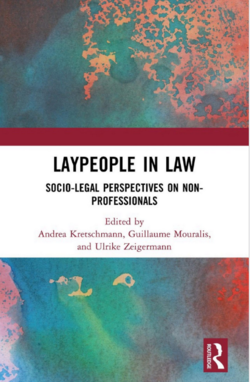
Laypeople in Law: Socio-Legal Perspectives on Non-Professionals
01 avril 2024
Guillaume Mouralis
,
Ulrike Zeigermann
,
Andrea Kretschmann
ISBN: ISBN 9780367680978
This book contributes to a better understanding of the role laypeople hold in the social functioning of law.
It adopts the scholarly insight that the law is unthinkable without an everyday legal understanding of the law pursued by laypeople. It engages with the assumption that not only the law’s existence but also its development is shaped by the layperson’s affirmations, oppositions, ignorance, or negations of the law. This volume thus aims to fill a void in socio-legal studies. Whereas many sociolegal theories tend to conceptualize the law through legal experts’ actions, institutions, procedures, and codifications, it argues that such a viewpoint underestimates the role of laypeople in the law’s processing and advocates for a strengthened conceptual place in socio-legal theory.
This book will appeal to socio-legal scholars and sociologists (of law), as well as to legal practitioners and laypersons themselves.
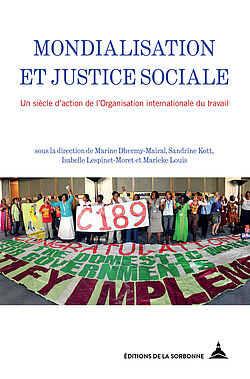
Mondialisation et justice sociale. Un siècle d'action de l'Organisation internationale du travail
28 mars 2024
Marieke Louis
, Marine Dhermy-Mairal, Sandrine Kott et Isabelle Lespinet-Moret
Internationale
Edition: Éditions de la Sorbonne
Collection: Internationale
ISBN: 979-10-351-0922-6
L'Organisation internationale du travail est née du traité de Versailles en 1919, a survécu à la Société des nations et a trouvé sa place au sein de l'Organisation des Nations unies, où elle a apporté l’héritage et le savoir-faire du premier internationalisme, et la spécificité du tripartisme. L’OIT a formulé et poursuivi des idéaux de réforme sociale, fondés notamment sur la production de savoirs et d’expertise, dans un siècle traversé par des conflits majeurs, les décolonisations et l’évolution des rapports de force, entre les mondes capitalistes et communistes, entre les États et entreprises du Nord et du Sud.
Cet ouvrage fait suite à un colloque qui a rassemblé acteurs sociaux et chercheurs pour célébrer les cent ans de l’Organisation internationale du travail et interroger son rôle face à la mondialisation des économies et du travail. Il éclaire de manière pluridisciplinaire la fécondité et le renouvellement de la recherche sur la plus ancienne organisation du système onusien. Les contributions se penchent sur la nature et les principales missions de l’Organisation à travers les nouvelles approches des sciences sociales suscitées par les interrogations de notre époque. L’efficacité des normes internationales du travail dans un marché mondial, l’importance du tripartisme et du dialogue social face au retrait de l’État comme les limites de l’universalité dans un monde inégal sont ainsi discutées dans une perspective renouvelée et résolument internationale. À travers l’OIT et sa promesse de justice sociale, ce volume propose plus largement une autre façon de penser la mondialisation.
